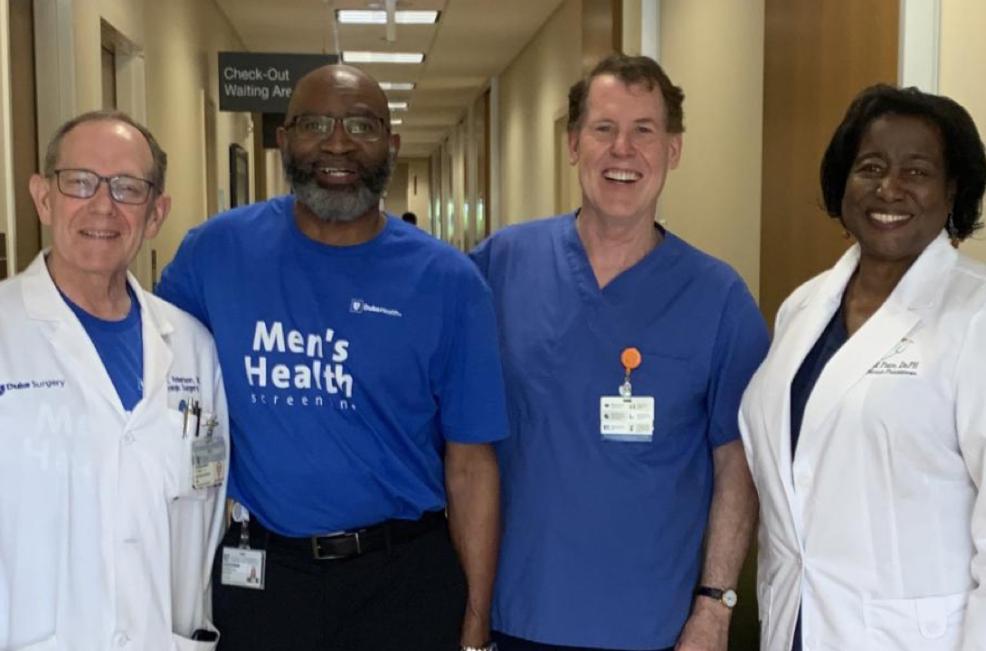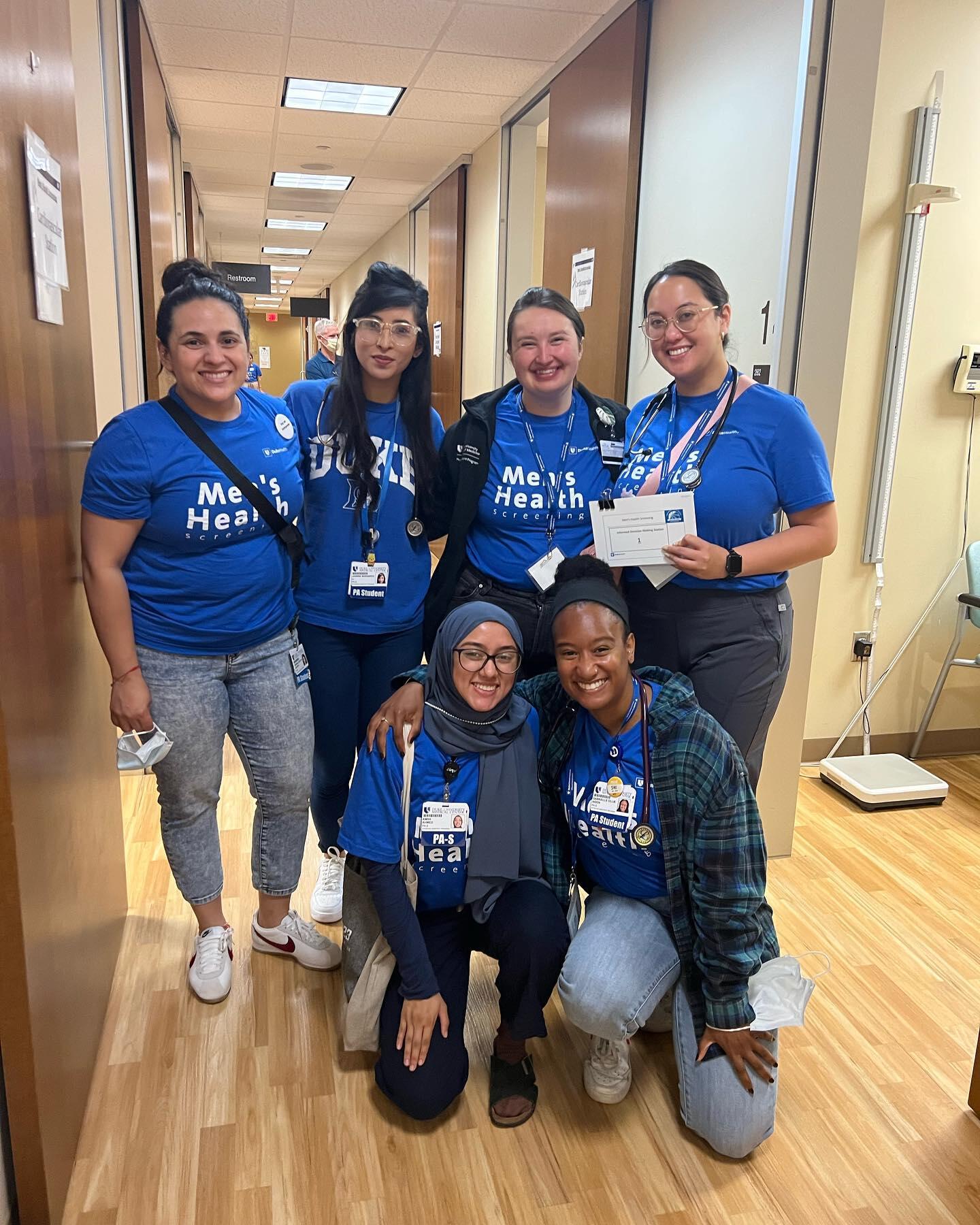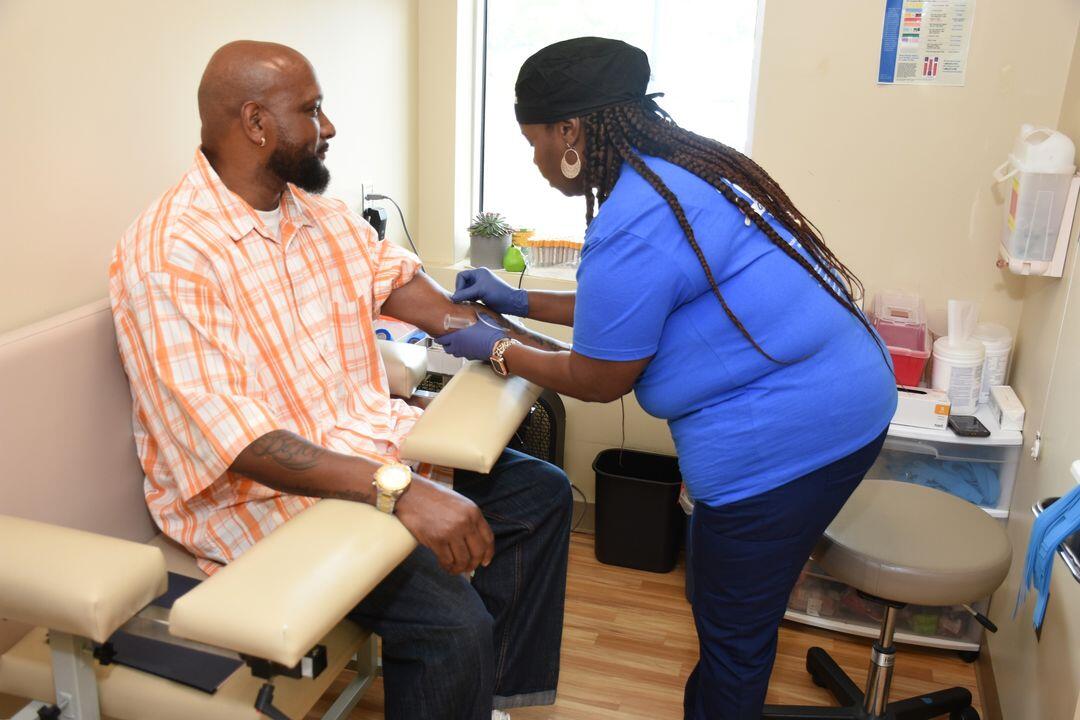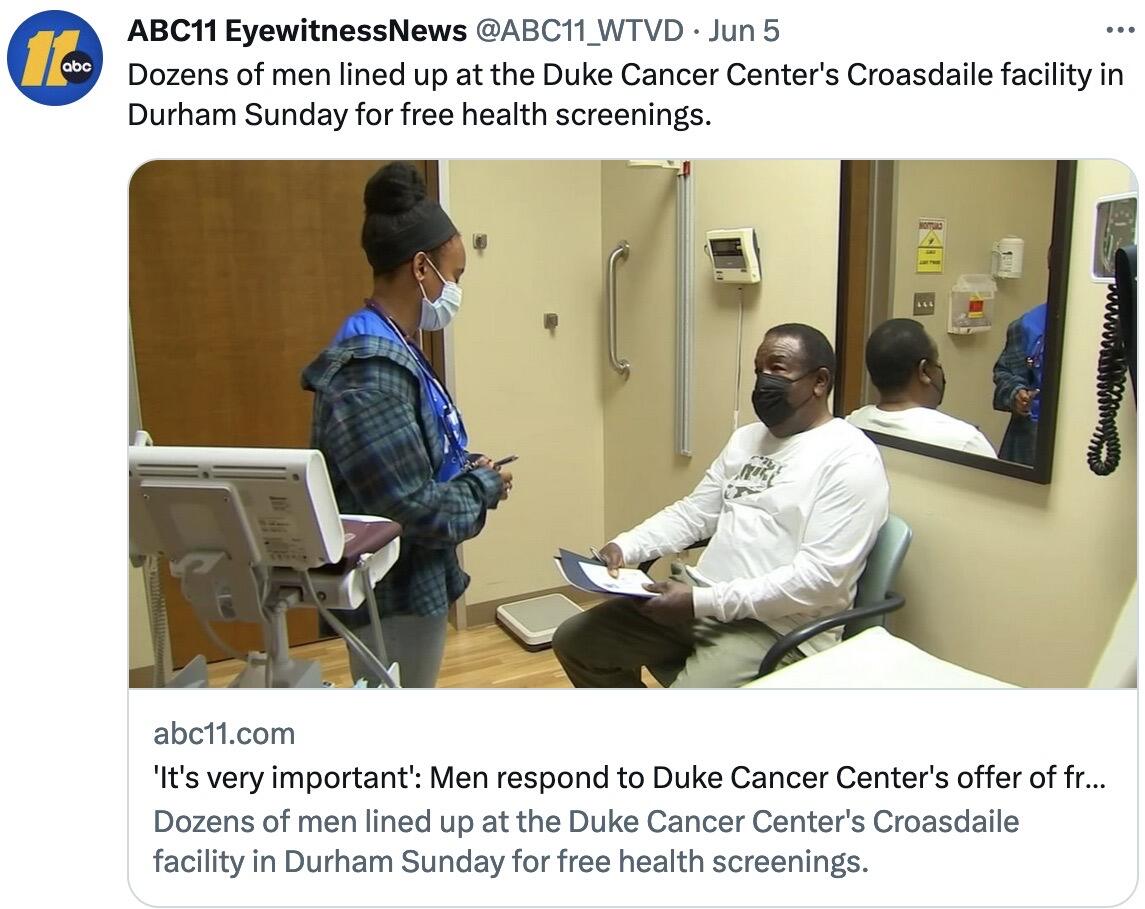Update
Background
The annual Mens Health Screening event is aimed at helping improve the health outcomes of men in the community. The Office of Health Equity, Duke Primary Care-Croasdaile, and Lincoln Community Health Center (a local federally qualified health center), collaborate to increase awareness of, and screen for, prostate, skin, and colon cancers, as well as conduct lung cancer risk assessments.
The event also provides educational resources and assessments for chronic health conditions such as hypertension, diabetes, and HIV/Hepatitis C. Tests and screenings include on-the-spot blood pressure screening; HIV and Hepatitis C screening; American Diabetes Association assessments for diabetes risk (ADA Diabetes Risk Test); HgbA1C blood tests to measure blood sugar levels (used in the diagnosis of pre-diabetes and diabetes); and screening of the skin for diabetes.
Our community partners share information about tobacco cessation and make referrals to DCI's Quit at Duke program as well as offer tips to encourage healthy lifestyle behaviors related to diet and exercise.
The chief goal of this community outreach program is to provide screening services to men who are at high risk for life-threatening illnesses and diseases.
Patient navigators work with participants who receive abnormal test or screening results and concerning findings to help address health concerns by connecting them with accessible, comprehensive, and high-quality primary and specialty care, health education resources, and/or additional patient navigation services.
According to the CDC (Centers for Disease Control), the leading causes of death in U.S. men of all races are heart disease (24.2% of deaths) and cancer (22.5% 3) followed by unintentional injuries, chronic lower respiratory disease, stroke, diabetes, Alzheimer's disease, suicide, chronic liver disease, and kidney disease.
The top two killers of non-Hispanic White men, non-Hispanic American Indian or Alaska Native men, Hispanic men, and non-Hispanic Black men, are heart disease followed by cancer, but for non-Hispanic Asian or Pacific Islander men, it's cancer followed by heart disease.
Prostate cancer is the second leading cause of cancer death in U.S. men after lung cancer. Colorectal cancer is not far behind prostate cancer.
“The purpose of screening is to detect when something is not right when there are no signs or symptoms of any abnormalities," says OHE Director Angelo Moore, PhD, RN, NE-BC. "When cancer is detected in earlier stages, patients have more treatment options, less harsh treatments, less expensive care, and better outcomes.”
The annual community event is a collaborative effort to not only provide recommended cancer screenings and other health screenings — free of charge — but to educate and boost awareness around cancer and other health issues. The event would not be possible without the support of Duke, Durham, and North Carolina community partners.
The Men's Health Screening event began in the 1990s as a prostate cancer screening and education initiative of the Duke Genitourinary Cancers clinic team at Duke Urology. The DCI COEE (previously called OHE and OHED) has co-led the annual health fair with Duke and Durham partners, including Duke Urology, Duke Primary Care, and the Durham County Department of Public Health and its Lincoln Community Health Center, since 2012. Additional Duke and community partners joined the effort as the event expanded over the past decade to include colon cancer screening, blood pressure checks, diabetes screening, tobacco cessation counseling, skin cancer screening, and nutrition/healthy eating counseling.
After a two-year hiatus due to the COVID-19 pandemic (2020-2021), the annual Men’s Health Screening Event resumed in 2022.
2023 Post-Event Summary
This year's event was hosted by the DCI Office of Health Equity (OHE), Duke Primary Care-Croasdaile, and Lincoln Community Health Center, with the support of the Durham County Department of Public Health, North Carolina Department of Health & Human Services, Lung Cancer Initiative, Duke Urology, Duke Gastroenterology, Duke Outpatient Phlebotomy, Duke Endocrinology and Metabolism, Duke Dermatology, Duke Health System Laboratories, and Duke Well.
Office of Health Equity team members, site sponsors, and collaborators provided cancer screenings and health assessments at the Lincoln Community Health Center and Duke Primary Care-Croasdaile, including:
- Prostate cancer screening (PSA and DRE)
- Colon cancer screening
- Blood pressure checks
- Diabetes risk assessments and evaluations
- Tobacco cessation and vaping counseling
- Skin cancer screenings and
- Nutrition/healthy eating counseling
Participants were welcome to take part in as many screenings and assessments as desired, with no appointments necessary.
Following the event, the OHE research and evaluations team ran the numbers and reported that participation was once again on the rise.
Following a hiatus in 2020 and 2021 during the Covid pandemic, and a strong showing in 2022 with 181 men screened/assessed, the 2023 event topped 200 screened/assessed (207).
Some highlights
- Prostate Cancer: Out of 138 PSA (prostate-specific antigen) blood tests administered, 14 showed abnormal results. Out of 104 direct rectal exams (DRE) given to screen for prostate cancer, four men received an abnormal reading.
- Colorectal Cancer: A total of 118 individuals requested and received a take-home FIT kit, a fecal immuno-chemical test that looks for hidden blood in the stool. Such a finding typically prompts a referral for a colonoscopy. About 62 men returned the completed test for evaluation and seven were referred for colonoscopy.
- Skin Cancer: Of those men screened for skin cancer (129), four were found with abnormal areas of concern.
- Lung Cancer: Of those men screened for lung cancer risk (9), four were found to be at high risk for the disease and were referred for a low-dose CT scan appointment.
- Blood Pressure: Out of 137 men who had their blood pressure taken, 101 measured high (stage 1 & stage 2), and two were found to be in hypertensive crisis.
- Diabetes: Of 140 men who had their blood drawn to measure HgbA1C, 22 were found to be in the diabetes range
For a detailed breakdown of screening and testing data, participant demographics, and a full list of community and industry partners supporting the event, download the 2023 Men's Health Screening Report (with facts & figures)







